Ideas into movement
Boost TNI's work
50 years. Hundreds of social struggles. Countless ideas turned into movement.
Support us as we celebrate our 50th anniversary in 2024.

The Transnational Institute (TNI) was founded in 1974 as the international programme of the Washington DC-based Institute for Policy Studies. For 50 years, TNI’s history has been entwined with the history of global social movements and their struggle for economic, social and environmental justice.
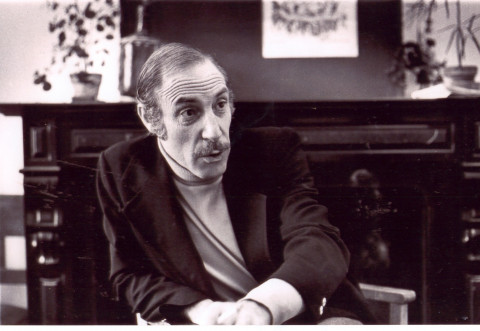
Photo by TNI
Frequently identified crucial issues on the horizon – third world debt, World Trade Organisation, corporate power, carbon trading - and played a key role in putting them on the agenda for social movements.
Been bold in tackling structures of power, even though this led to the assassination of its first director, Orlando Letelier by the Chilean secret service.
Had a deep mutually respectful relationship with grassroots movements,from national liberation movements in 1970s and 1980s to those comprising the global justice movement more recently.
Brought together and catalysed networks, from the foundation in 1977 of one of the first global organisations studying transnational corporations, Transnational Information Exchange, to the formation of the Linking Alternatives Network in 2006.
Dedicated itself to putting forward alternative proposals to reflect the just world that TNI, its Fellows, staff, and networks are committed to turning into reality.
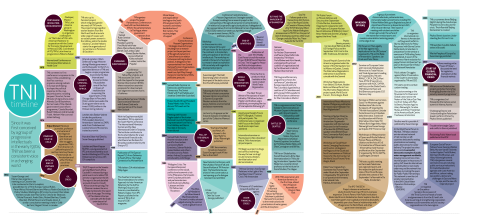
Nine years later in October 1972, at Barnet and Raskin’s request, Parisian-American Susan George arranged a dinner for them and for philanthropist Samuel Rubin with French political figures and intellectuals who all opposed the Vietnam War.
Some twenty five progressive people met that evening at the Closerie des Lilas in Paris (a renowned haunt of figures like Hemingway and Lenin) to discuss setting up the Transnational Institute in Europe.
After dinner, Samuel Rubin spoke to declare his hopes for TNI: “Since we all agree that the world is suffering from war, from inequities, from the inhuman treatment of perhaps more than two thirds of humanity, let us come together to examine these questions and to see what answers we can collectively produce that may perhaps deliver us, as humanity, as the human race, into a world different from the one we are living in today.”
In 1973, Eqbal Ahmad, a Pakistani journalist, professor, and dedicated revolutionary was commissioned to take a five-week trip across Europe to consult about the idea of the Institute with over 200 individuals representing a wide political and intellectual spectrum. He arrived as TNI's first Director to an empty building opposite the Van Gogh Museum in Amsterdam, given to TNI by philanthropist Ed Jans, on 9 November 1973. Soon he had turned TNI into an intellectual hub, bursting with activity.
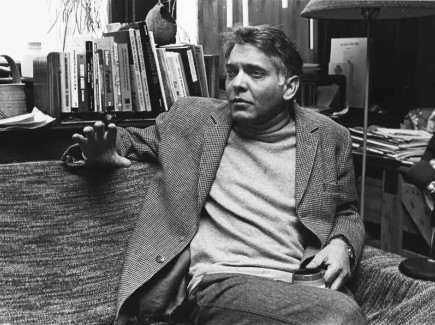
Your rich network of scholars, researchers and journalists helped to create the intellectual frame for the most important movements of my lifetime. I cannot describe how much I have learned from you, and relied upon you, over the years. Thank you for continuing to push yourselves, and all of us, to keep digging deeper.
Ahmad began awarding fellowships to support the work of promising individual scholars and writers from around the world, including the Booker prize-winning novelist John Berger, specialists like John Gittings, Richard Gott, Ernst Utrech, “Race and Class" editor A. Sivanandan and many others. Together they prepared a common framework for TNI’s programme. Ahmad thus laid the groundwork for an international network of scholar-activists committed to social change, which typifies TNI to this day.
Between 1974 and 1976, Ahmad also established close working relationships with a wide range of progressive organisations, such as Counter Information Services (CIS), the Institute of Race Relations (IRR) and the North American Congress on Latin America (NACLA).
In 1974, TNI held its first conference around the publication Lessons from Chile, in the aftermath of the military coup with many exiled Chileans including three former ministers of the Allende government in attendance. TNI joined IPS in leading an international campaign to isolate the military dictatorship of Pinochet in Chile.
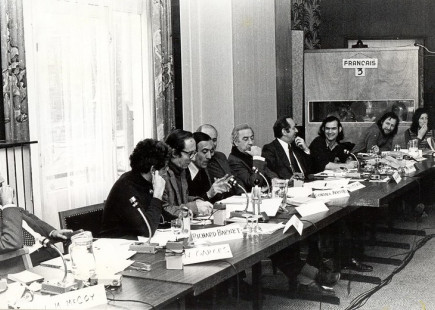
Two years later, Orlando Letelier, previously Chilean Foreign and Defence Minister and Ambassador to the US, was appointed director of TNI. Letelier not only persuaded the Dutch government to cancel a $60 million loan for Chilean industrial development, but also began a major programme to promote a New International Economic Order. On 21 September, 1976 Orlando Letelier together with Ronni Karpen Moffitt, a young fundraiser at IPS, were brutally assassinated in Washington DC with a car bomb. TNI and IPS investigators working in cooperation with the FBI, revealed the involvement of the Chilean secret police, DINA.
TNI and IPS have continued to fight to bring to justice those responsible for the death of Letelier and thousands of other Chileans. Each year, IPS hosts the Letelier-Moffit human rights award to honour these fallen colleagues while celebrating new heroes of the human rights movement in the United States and elsewhere in the Americas.
TNI has continued to work closely with its fellowship of scholar-activists in various configurations. For decades, the annual gathering of fellows, scholars and activists from around the world was a nurturing time to hatch new ideas and cross fertilize different areas of knowledge, shaping the programme work of the organisation and forging connections between movements around the world.
This large network of scholars and activists has in more recent times – since 2012 – contributed to work such as TNI’s flagship State of Power reports, each of which focuses on a different theme, ranging from counter power, to state coercion to digital power. During the COVID-19 lockdowns, TNI worked with partners to convene online learning and sharing activities, including a series of highly successful webinars.
Starting in 2024, TNI’s new expanded fellowship got to work, continuing a tradition of exchange of internationalist knowledge, to bring ideas into movement.
TNI was set up at a critical time, when neoliberalism was preparing to take over with the message … that we are condemned to austerity policies, growing inequalities, and the transformation of the welfare State into the competitive State. TNI and others have fought the battle of ideas throughout these years to show that there is no fatality, and that another world is possible.
From 1976, under the directorship of Basker Vashee, a Zimbabwean trained at the London School of Economics, TNI became the place in Europe for African liberation movements to meet. Basker played a key role in the Zimbabwean national liberation movement and participated in the Lancaster House talks, which resulted in the first democratic elections of an independent Zimbabwe in 1980.
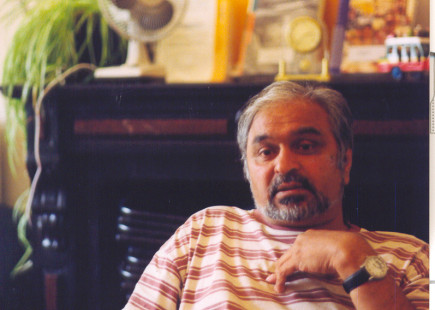
TNI helped link up social movements working to boycott Apartheid South Africa, and also published research, such as Black South Africa Explodes on the 1976 uprising in Soweto, and US Arms Deliveries to South Africa: The Italian Connection, which drew attention to those propping up the regime. TNI also facilitated briefings for Dutch parliamentarians by officials from South Africa’s neighbouring states on the impact of South Africa’s destabilisation efforts. In 1983, Thabo Mbeki, then an ANC delegate and later President of South Africa, and his brother Moeletsi visited TNI on several occasions to discuss the work on South Africa, which included post-apartheid scenarios.
TNI actively supported other liberation struggles, notably in Central America against US intervention and in the Philippines against the Marcos dictatorship. It also worked with the Turkish labour movement in opposing Turkey’s military coup. In 1977, TNI even sheltered the controversial CIA whistleblower Philip Agee, author of Inside the Company.
In 1975, TNI set up its Feminist project, which integrated gender into much of TNI’s work. The project brought together women leaders from the North and South around a wide range of issues such as nuclear power, women in the military, and in the textile industry. The group included Wendy Chapkis, Sheila Rowbotham, Eileen Utrecht and Cynthia Enloe.
In 2007, I had the honor and pleasure, as General Secretary of the JND (National Drugs Board) of Uruguay, to organize together with TNI and WOLA the first Informal Dialogue on Drug Policies in Latin America. The results we have today in Uruguay in the field of drugs and human rights can be traced back to then… The ongoing support you have provided…also allowed us to join forces with colleagues and friends throughout Latin America.
For more than five decades, TNI has worked on issues related to corporate globalisation –now recognised as critical grounding for today’s “Global Justice Movement”. TNI’s work was often undertaken several years before donors and the general public recognised the significance of the examined issues. The institute frequently served as the intellectual catalyst for movements that then worked to raise public awareness.

Perhaps more than any other writer, TNI fellow (now President) Susan George has popularised the understanding of power and the consequences of globalisation. Her first book, How the Other Half Dies; the Real Reasons for World Hunger, published in 1976, proved to be a ground-breaking work. Scholar-Activist George has published over a dozen influential books on many subjects of concern to social movements. Another TNI Fellow, Howard Wachtel, wrote what is still seen as the seminal work on global finance – The Money Mandarins.
In 1978, TNI helped set up the Transnational Information Exchange (TIE) to support the international labour movement and others with studies of multinational corporations and their role in shaping global trends in production and consumption.
In 1982, TNI started working actively on Third World Debt, setting up a debt project in 1985, many years before others made debt a popular issue. Susan George’s A Fate Worse than Debt and the Debt Boomerang are classics in the field. In 1995, TNI was among the first to draw attention to the dangers of the World Trade Organisation, producing the only critical materials available on the WTO in its early years, and running countless workshops for activists in Europe and the South. These activities, among others, came to a head at the historic 1999 Battle of Seattle, which successfully politicised international trade.
In 2009, TNI returned to its critique of corporate power with renewed vigour, launching a global campaign to stop corporate impunity, looking to expose the architecture of legal impunity that corporations enjoy and putting forward proposals for binding legislation to prevent corporate crimes.
TNI was part of the initial agenda-setting efforts among social movements that resulted in the international Global Campaign to Reclaim People’s Sovereignty, Dismantle Corporate Power and Stop Impunity (Global Campaign) being launched at Rio+20 in 2012. Just two years later, following an initiative of the Ecuador and South African governments, the UNHRC established an Open-Ended Inter-Governmental Working Group (OEIGWG) to develop an international treaty.
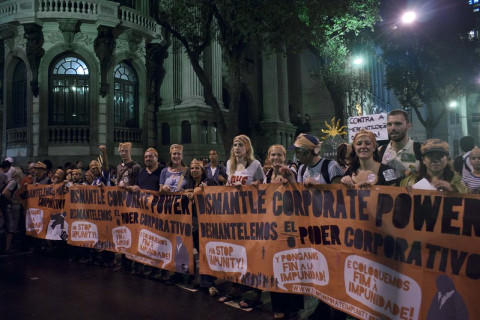
From the turn of the century, our ground-breaking research on international investment helped turn the hitherto unknown issue of Investor-State Dispute Settlement (ISDS) Mechanisms into a major focus of public concern. ISDS allows corporations to sue states in private courts for actions deemed a threat to future profits. Public outrage has been fueled by the steep increase in the number of claims; the exorbitant sums draining public coffers; the extraordinary powers over governments vested in a small coterie of arbitrators riddled with conflicts of interest; and parliamentary exclusion from democratic oversight over what governments sign up to in such treaties.
In the 2010’s, TNI’s exposés of secretive investment dispute courts prompted reviews by the Dutch, Ecuadorian and Finnish governments, supported by the United Nations Trade and Development (UNCTAD), an intergovernmental organization within the United Nations Secretariat that promotes the interests of developing countries in world trade. The public interest generated by this work brought the negotiations for controversial trade treaties – such as the Transatlantic Trade and Investment Partnership (TTIP) and the EU-Canada Comprehensive Economic and Trade Agreement (CETA)– to a virtual standstill, with a rising tide of voices from all political spectrums condemning these deals. More recently, we have seen the beginning of the end of the Energy Charter Treaty. The US, Canada and Mexico went on to exclude ISDS from NAFTA; Indonesia’s Constitutional Court ruled that all international trade and investment agreements must be subject to parliamentary ratification; Tanzania canceled its Bilateral Investment Treaties (BITs) with The Netherlands; the European Court of Justice ruled that all intra-EU BITs are illegal; and the International Court of Justice restricted its members from serving as arbitrators in ISDS arbitrations, preventing the potential conflicts of interest that TNI exposed back in 2012.
TNI also supported the Ecuadorian government, with one of our researchers chairing a commission on investment agreements that led the country in May 2017 to announce it would terminate its remaining 16 Bilateral Investment Agreements.
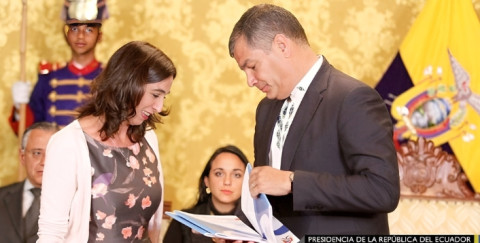
I have to congratulate TNI and Antel (Uruguay’s telecom company) for this type of initiative, which are very much needed to help us think and act… It is not possible to think of Uruguay without thinking of its public enterprises, because they constitute the backbone of our national project. But today, more than ever, they must be understood as the key drivers of development.
To build closer ties to social movements, the Institute between 1985 and 1995 developed a complement of project staff in Amsterdam who took regional responsibilities for Africa, Latin America, and Asia, and worked to support the international fellowship. This consolidated TNI’s close relationships with activists and their networks worldwide.
Time and again, TNI emphasised the importance of involving those at the frontline of struggles in discussions with researchers and policy makers. In 1982, for example, TNI held a conference on military conversion that brought workers and peace researchers from Britain, Italy and Germany to discuss conversion from military to socially useful production within the aircraft industry. In 1990, following the fall of the Wall, TNI hosted an historic encounter between democracy activists in Eastern Europe with Western activists from the peace, feminist, environmental and labour movements.
… TNI has been a vital part to the global social movements in our struggles for social, climate, and economic justice, food sovereignty and an alternative world that has at its heart the interests of the people. From the insightful analysis and publications to the collaborative campaigns, TNI’s critical contributions to the development of both critiques and proposals have been of great value to peasants, small farmers and social movements. … More power to our joint struggles!
For more than half of TNI’s history, its Drugs and Democracy work has made a significant contribution to dramatic developments in drug policy and brought together growers of prohibited crops from around the world.
TNI assisted with the successful re-adhesion of Bolivia to the international drug convention while demanding respect for the indigenous practice of coca-leaf chewing. TNI also advocated for respect for the unprecedented stance of the Organization of American states, who called for a profound analysis of the international drug regime.
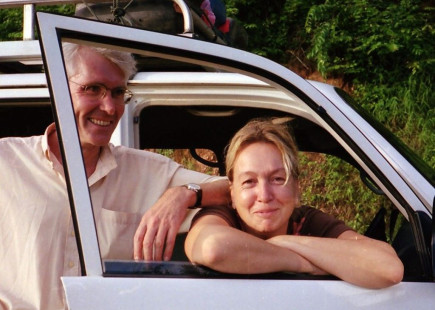
TNI was closely involved in assisting the Uruguayan government in 2013 as it became the first country in the world to end the prohibition of cannabis and introduce a state regulated market. Our experts commented on drafts of the legislative proposal, in particular in advising Uruguay on how to deal with its existing obligations under international treaties. TNI facilitated contacts with people who had been involved in implementing alternative models elsewhere, such as cannabis social clubs (non-commercialcultivation) in Spain. A member of TNI’s team was on the national commission that will monitor the application of the law in Uruguay.
TNI advised the Canadian government as it took its first steps towards legal regulation of cannabis markets, providing expert advice to its Senate.
Following involvement in a number of Asian policy dialogues co-organised by TNI, Thailand announced its intention to legalise medical cannabis, which a number of Southern African countries also did in 2018.
TNI famously ensured that peasants have a voice in international drugs policy. For the first time, thanks to TNI, representatives of Latin American farmers attended the UN Special Assembly on Drugs in New York in 1998. TNI is now recognised as one of the world’s foremost non-governmental institutes and authorities on drugs.
From the late 1970s, the institute hosted regular activities focused on NATO and the militarisation of Europe.
In 1982, TNI Fellow and CND leader Mary Kaldor and TNI Associate (later TNI Director) Dan Smith together published Disarming Europe, on disarmament, non-alignment and new forms of defence.
In the 1990s, TNI’s Indian Fellows Achin Vanaik and Praful Bidwai emerged as key resources for the nuclear disarmament movement. In 1995, TNI set up a New Non-Proliferation Treaty project together with WISE in The Netherlands, publishing Beyond the Bomb: The Extension of the Non-Proliferation Treaty and the Future of Nuclear Weapons. The same year, TNI published a prescient book, The Next Threat: Western Perceptions of Islam, co-written by Jochen Hippler, TNI Director from 1992-1994, known for his deep knowledge of Afghanistan, Pakistan, and the Muslim world. The book highlighted the dangers of western policy in the Middle East and debunked myths about the nature of Islam and Islamic movements.
In the wake of the Kosovo War in 1999, TNI Fellow Mariano Aguirre also facilitated debates in many countries to ask whether ‘humanitarian intervention’ was being used to justify military interventions.
TNI supplies us with invaluable ideas and materials and organises international support on a level that other institutions have never done.
As early as 1997, TNI warned that the US was eager to launch a new war on Iraq. As the war broke out in 2003, TNI Fellow Walden Bello played a key role building bridges between the anti-globalisation and anti-militarist wings of the new social movements, thereby helping to forge the largest global anti-war movement in history. Other fellows, like Phyllis Bennis, a US-based writer, activst and expert on the Middle East and Kamal Mahdi, an exiled Iraqi scholar consistently opposed the occupation of Iraq; Bennis’ work has also served as a compass for movements concerned with US policy towards other countries in the region, including Iran and Palestine.
TNI was also instrumental in analysing the infrastructure of empire, developing an innovative map of more than 800 foreign military bases worldwide and hosting for a few years the International Network for the Abolition of Foreign Military Bases.
TNI’s roots in international anti-war movements have persisted and we have continued to equip movements with research on militarism, the border industry and surveillance. We also drew the connections between securitisation and a number of salient issues, from drug policy to climate change, and urged more just and equitable approaches.
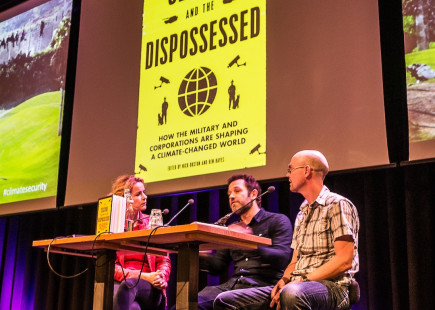
With the Dutch Campaign Against the Arms Trade we showed how the top sellers of arms to the Middle East were also the major winners of EU border contracts. In other words, the same companies helping to fuel the conflicts creating refugees were now being paid to militarize the borders to keep them out.
TNI also worked closely with the UN Special Rapporteur on counter-terrorism and human rights, who contributed to a report on the globalization of ‘countering violent extremism’ (CVE) policies.
In the 2020’s TNI has worked to bridge the climate and anti-militarism movements by showing how military spending and arms sales have a deep and lasting impact on the capacity to address the climate crisis. Every dollar spent on the military not only increases greenhouse gas (GHG) emissions, but also diverts financial resources, skills and attention away from tackling one of the greatest existential threats humanity has ever experienced.
TNI has never been satisfied to be only a critical voice, but has always devoted itself to evaluating and proposing alternative policies to promote democracy, equity and sustainability. In 1994, TNI published Beyond Bretton Woods by TNI Fellow John Cavanagh and others, which mapped alternatives for the global economic order.
In 1999, TNI undertook the New Politics project to examine the perceived limits of representative democracy and the new momentum – especially in Latin America – for more direct, participatory forms of democracy. The project documented, publicised and evaluated actual experiences with popular democracy, as well as the formation of new kinds of political parties emerging from social movements in Europe, across Latin America, and more recently in Asia.
When the World Social Forum met for the first time in Porto Alegre in 2001, TNI was well placed to serve as an important intellectual resource for the movements that converged there, and was able to keep its finger on the pulse of the new global movement for justice.
Through TNI, I was able to learn about the international laws, different models of regulations in Europe as well as meet growers from Bolivia, Guatemala and other countries facing similar situations. I know it won’t be possible to change policies overnight but working internationally with groups like TNI helps us advocate a more human-rights and people-centered approach.
At the World Social Forum in Mumbai in 2004, TNI helped catalyse an international network of 130 members in 38 countries dedicated to ending privatisation and seeking public alternatives for water delivery. Privatisation was in full force. It was frequently imposed as a condition for aid and loans by donor countries and international financial institutions like the IMF and the World Bank. With the network, TNI documented successful democratic examples of public water management worldwide, drawing more and more cities into the project in the process. A policy shift towards alternatives to privatisation is clearly under way, and the network has been key in creating the space for Public-Public Partnerships, that is, “twinning” arrangements between public water operators.
While exposing the many problems caused by private corporations is a necessary part of the task, TNI’s work has focussed on alternatives to privatisation, documenting and sharing successful, and often very innovative, experiences of publicly managed services that have improved their reach and quality. The key to success is genuine participation of those involved in providing and using the services.
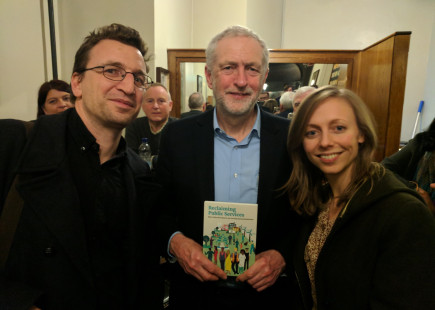
In 2017, our pioneering Reclaiming Public Services report, which for the first time counted and listed the wave of cities bringing services back under public control, was published. It has been cited constantly, including by the UK Labour Party leader Jeremy Corbyn. Building on this research, TNI in 2017 also launched a new participatory award, Transformative Cities, to recognize and promote localities leading and delivering radical economic and social justice – a showcase of some extraordinary prefigurative cases of how transformation can be achieved.
TNI connects struggles to bring services under democratised public control with questions of energy democracy and just transitions. Since 2016, we have helped build a strong network for energy democracy – which has grown to 400 organizations and individuals. We have also been part of an effort to support South African trade unions to develop a comprehensive proposal for transforming the country's beleaguered electricity utility (Eskom) such that it is fit to lead a just energy transition.
On the European front, we were part of the mPower project. From 2018 to 2022, we engaged more than 80 European municipalities in peer-to-peer learning about energy democracy and just transitions, with six subsequently declaring a climate emergency. mPower played a pioneering role in building social infrastructures committed to just transitions among cities and with CSOs.
In 2008, as it became clear that the world faced a convergence of crises – rising food prices, financial and economic collapse, and an impending climate catastrophe – TNI was quick to respond to the challenge.
The institute had long warned that current economic policies were unsustainable and had targeted financial liberalisation as particularly dangerous. TNI fellow Walden Bello raised the alarm of its implications as soon as the Asian financial crisis broke in 1997. In 2007, TNI’s Fellows’ meeting explored the ‘Power of Money’ in the global economy, and discussed the need for regulatory mechanisms that are now part of the official agenda.
When the financial crisis took hold in October 2008, TNI was at the forefront of organising a civil society response, ultimately issued as the Beijing declaration. The demands expressed in this manifesto have been at the heart of the civil society response ever since. As the private debt crisis turned into a public debt crisis in the EU, TNI worked closely with its ally the Corporate European Observatory to critique failing austerity policies, challenge the capture of the European Commission by financial interests and to defend democracy in Europe as it was challenged by economic policies that put markets before people.
TNI is admirable in its capacity to go straight to the heart of the matter. It keeps finding, detecting the dangers that our societies confront, dangers that go well beyond the familiar. Today’s powerful actors are not only people. The landscape is far more complex and diverse than the familiar power grabber and the massive concentrations of wealth. TNI goes to the innards of the system, that which we often cannot see, that which is rarely mentioned in the media. The work TNI has done on high finance is a strong example of this modus operandi.
The environmental crisis has also been on TNI’s agenda for many years. In 1990, TNI began a project that eventually resulted in the publication, in 1998, of Privatising Nature, inspiring a whole new generation of activists to make the connection between ecology and the economic paradigm. In 2003, TNI began work on challenging the carbon trading market. Initially, TNI’s critique of free market mechanisms for resolving climate change was not well received, even by environmental NGOs. However, by 2008 when NASA scientist James Hansen called carbon trading a “giant scam”, TNI’s critique had progressively become part of the consensus. In 2012, TNI developed on this work as it critically unpacked proposals for a 'Green Economy' made at the Rio+20 conference in Brazil, which obscure attempts by corporations to further commodify 'nature' by pricing nature as a new marketable asset.
For La Via Campesina and the peasant movement one of the central conflicts is the one between peasant based and corporate driven agriculture. Over the last years TNI has taken up an important role in the work on corporate issues. These issues have taken new relevance with issues such as land grabbing and resource grabbing in the broader sense. We really hope that you can strengthen your work on corporate issues and continue to be of very valuable ally our movements.
In 2014, TNI proudly celebrated 40 years, receiving accolades and appreciation from renowned activists and academics around the world. And now, 50 years on , TNI’s founding spirit of engaged scholarship in the service of progressive, transnational social movements remains as lively as ever. Its foresightedness, capacity to produce high calibre research materials for popular and official audiences alike, and its credibility with the important movements of our time make it an exceptionally valuable institute, think-tank and public resource.
TNI is always right on the pulse of what are the important cutting edge issues of our times. As a thought leader on social and ecological justice issues, I can trust their scholarship and revolutionary analysis that is crucial in challenging patriarchal, colonial, racialised and capitalist notions on what needs to be prioritized and re-valued. Their public alternatives project, in particular, surfaces well researched and incisive analysis on why our anti-capitalist visions and practices must go together, and provides a credible foundation for our feminist organising and advocacy agendas.
TNI has built the capacity of small-scale food producers to defend their land and resource rights, and to advocate for agroecology to secure food sovereignty, sustainable food systems, and address the climate crisis. TNI produced abundant accessible and high-quality research on ‘land grabbing’ and what is driving it. Our work highlights not only land, but also water and forests, seized by players including local elites, European banks and pension funds. Our linking up of local communities struggling for control of water and land resulted in new transnational partnerships and a stronger voice for justice at critical international fora.
TNI provided vital technical support for small-scale food producer organisations participating in the multi-stakeholder negotiations on responsible agricultural investment at the FAO, including representatives of peasant, pastoralist, fisher folk, and indigenous people’s organisations. By analysing official negotiating texts and workshopping a number of TNI briefings geared for knowledge empowerment and building advocacy capacity, TNI helped these social movements to articulate their positions in this premier global food security policy-making forum.
Over the past five years, successes include the United Nation’s (UN) Food and Agricultural Organisation (FAO) embracing agroecology and embedded local markets; the adoption by the UN General Assembly of the UN Declaration on the Rights of Peasants and Other People Working in Rural Areas (UNDROP), and Uruguay adopting a new national plan for agroecology after concerted work by TNI partner REDES. Further, following successful advocacy sustained by TNI and allies, the European Parliament passed a resolution expressing concern at how EU policies were facilitating damaging land grabs that threatened Europe’s small-scale farms, and citing TNI research. Since then, the EU’s Farm to Fork Strategy – as part of the European Green Deal effort and the result of long-time pressure from civil society – has been announced, and the Committee on the Regions has identified agroecology as a key driver of positive change.
In 2024, we celebrate our 50th anniversary and take stock of the progress made, all that we have achieved with our partners, and we remember those departed comrades who have passed on along the way.
Every day TNI staff communicate with allies around the world, providing the information, analysis, network connections and international policy access that social movements need to challenge entrenched power and effect meaningful alternatives.
Much has changed, but looking back we can see TNI has consistently accompanied and supported some of the most significant struggles of the times – against neoliberalism, military dictatorships, Apartheid, nuclear weapons, debt, structural adjustment programmes, corporate impunity, privatization, militarism, securitization and racism – and continues to do so.